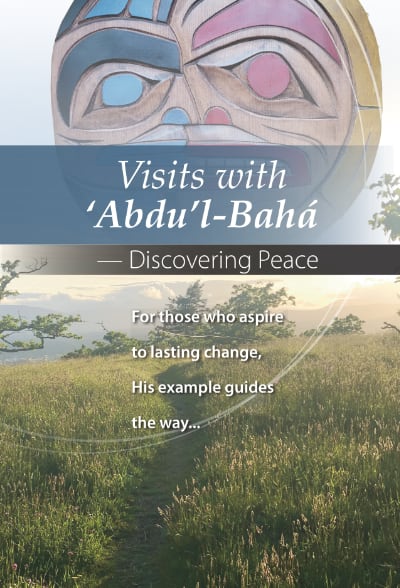
Discovering Peace
This presentation of stories about ‘Abdu’l-Bahá was created for the occasion of the centenary of His passing. It includes stories about encounters with ‘Abdu’l-Bahá and other prayers and devotional readings drawn from His writings.
The presentation is also available for download as a PDF or as a printed pamphlet
Further information about this period is in the Ascension of ‘Abdu’l-Bahá section of Bahai.ca.
On April 15, 1912, Hudson Maxim—an arms dealer who had lost a hand while developing explosives—stood in the reception room of the Hotel Ansonia, awaiting a word with ‘Abdu’l-Bahá. He had a bone to pick with the “prophet of peace.”
‘Abdu’l-Bahá greeted him in English: “Welcome! Welcome! Very welcome!” They exchanged pleasantries, then Maxim got down to business.
“I understand you are a messenger of peace to this country,” he began. “What is your opinion of modern war?”
“Everything that prevents war is good,” ‘Abdu’l-Bahá replied.
“Do you consider the next great national war necessary?” Maxim asked.
“Why not try peace for awhile?” ‘Abdu’l-Bahá answered. “If we find war is better, it will not be difficult to fight again; but if we find that peace is the glorification of humanity, the impulse of true civilization, the stimulus to inventive genius and the means of attainment to the good-pleasure of God, we must agree to adhere to it and establish it permanently.”
Maxim tried a different tack: “Fewer are killed in modern engagements than in the battles of ancient times; the range is longer and the action less deadly.”
This was two years prior to the onset of World War I.
‘Abdu’l-Bahá invited Maxim to consider the world beyond the narrow confines of the battlefield, pointing out that “the after-effects [of war] are even more dreadful than the initial shock… The country suffers beyond all power of estimation; agriculture is crippled, abandoned; sustenance fails, poverty and suffering continue long afterward.”
Maxim’s arguments about war that morning ran the gamut of nineteenth-century myth. For example, he claimed that war is human nature; that conflict is an ingredient of healthy social evolution; that economic interests will trump national hostility; that the deadlier the weapon the less likely it will be used—that deterrence equals peace. “War is no more dangerous now than automobiling,” he claimed.
‘Abdu’l-Bahá could present a compelling argument, but He never pressed a point. Instead, He turned the conversation toward the subject of Maxim himself.
“You are a celebrated inventor and scientific expert whose energies and faculties are employed in the production of means for human destruction… Now you have the opportunity of becoming doubly famous. You must practice the science of peace… You must discover the means of peace; invent guns of love which will shake the foundations of humanity.”
“Then,” ‘Abdu’l-Bahá added, “it will be said by the people of the world, this is Mr. Maxim, inventor of the guns of war, discoverer of high explosives, military scientist, who has also discovered and invented means for increasing the life and love of man, who has put an end to the strife of nations and uprooted the tree of war… Then will your life become productive with really great results… God will be pleased with you and from every standpoint of estimation you will be a perfect man.”
“An Arms Dealer Tries to Sell War to ‘Abdu’l-Bahá,” by Jonathan Menon
One day in London, a visitor asked ‘Abdu’l-Bahá this question: “Will this unhappy world ever be happy?”
‘Abdu’l-Bahá said to him, “It is nearly two thousand years now since His Holiness, the Lord Christ, taught this prayer to His people: ‘Thy Kingdom come, Thy Will be done on earth as it is in Heaven.’ Do you think that He would have commanded you to pray for something which would never come? That prayer is also a prophecy.”
The visitor said, “But, ‘Abdu’l-Bahá, when will the Kingdom come? How soon will His Will be done on earth as it is in heaven?”
“It depends,” said ‘Abdu’l-Bahá. “It depends upon how hard each one of you serves the Cause day and night. You are all torches that I have lighted with mine own hands. Go forth and light others until all the separate waiting servants are linked together in a great Unity.
“Those who are working alone,” He said, “are like ants, but when they are united, they will become like eagles. Those who work alone are as drops, but when united, they will become a great river which will carry the clean water of life into the desert places of the world. When this great river of life becomes a flood, all misery and sorrow and grief will be washed away. Be united! It is dangerous to be a drop all alone; it might be spilled or blown away.”
The Chosen Highway, by Lady Blomfield, pp. 171-172
‘Abdu’l-Bahá was invited to give a talk in Washington, DC, on the night of April 24. He was wonderfully exhilarated, though He had already given two talks earlier that day. As His automobile sped through the streets of Washington to take Him to the home of the celebrated inventor of the telephone, Alexander Graham Bell, His voice could be heard, loud and clear, exclaiming: “O Bahá’u’lláh! What hast Thou done! O Bahá’u’lláh! May my life be sacrificed for Thee! O Bahá’u’lláh! May my soul be offered up for Thy sake! How full were Thy days with trials and tribulation! How severe the ordeals Thou didst endure! How solid the foundations Thou hast finally laid, and how glorious the banner Thou didst hoist.”
Alexander Bell had personally called the previous day to invite ‘Abdu’l-Bahá to a special gathering at his home. A number of the guests who were experts spoke first, and then the host asked Ali-Kuli Khan, a Persian diplomat, to tell them of the history of the Bahá’í Faith. Next, he requested ‘Abdu’l-Bahá to speak, and when it was the turn of another of those eminent men to address the meeting, that man had only this to say: “Where this Seer from the East has spoken, no room is there for my inadequate speech”, and he sat down. It was well past midnight when ‘Abdu’l-Bahá departed.
‘Abdu’l-Bahá: The Centre of the Covenant of Bahá’u’lláh, by H. M. Balyuzi, p.183
One day the Master spoke with infinite sadness after hearing of a tragic battle in north Africa between the Ottoman Turks and the Italians: “I am not happy this morning. I am full of sadness. The news which the paper brought us was such as must fill one with anguish. Animals fight, and when they fight, it is for a cause, an end to be gained…
“The earth is the first and lowest of terrestrial things created by the Divine Will —and it is our tomb, our sepulchre, our cemetery; our death, not our life—and these men are fighting not for liberty or an ideal, but for ground, for the place of death not life…!
“You are a people banded together to increase friendship among nations and races and brotherhood among men. So now, while these men are creating death, you think life, while they are guilty of cruelty, you think tenderness, while they make destruction, you think construction, while they create war, you think peace.”
‘Abdu’l-Bahá in Their Midst, by Earl Redman, pp. 42-43
I charge you all that each one of you concentrate all the thoughts of your heart on love and unity. When a thought of war comes, oppose it by a stronger thought of peace. A thought of hatred must be destroyed by a more powerful thought of love.
Paris Talks, by ‘Abdu’l-Bahá, Talk given October 21, 1911
A Prayer by ‘Abdu’l-Bahá
O Thou kind Lord! Thou hast created all humanity from the same stock. Thou hast decreed that all shall belong to the same household. In Thy Holy Presence they are all Thy servants… all have gathered together at Thy Table of Bounty; all are illumined through the light of Thy Providence.
O God! Thou art kind to all, Thou hast provided for all, dost shelter all, conferrest life upon all. Thou hast endowed each and all with talents and faculties, and all are submerged in the Ocean of Thy Mercy.
O Thou kind Lord! Unite all. Let the religions agree and make the nations one, so that they may see each other as one family and the whole earth as one home. May they all live together in perfect harmony…
Thou art the Mighty and Powerful, Thou art the Forgiving and Thou art the One Who overlooketh the shortcomings of all mankind.
Visits with ‘Abdu’l-Bahá
Read prayers and stories about the example of ‘Abdu’l-Bahá
